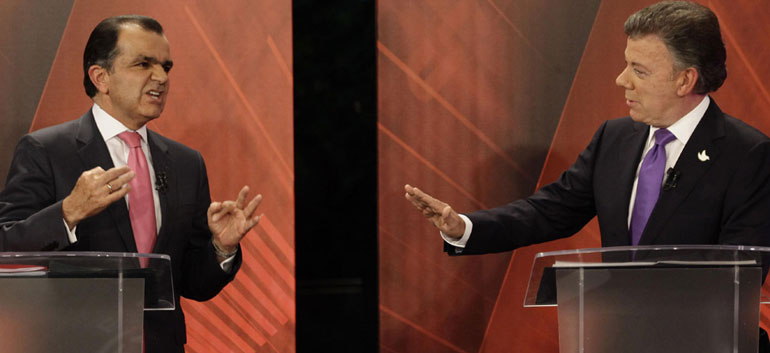Presidential candidates Juan Manuel Santos and Oscar Ivan Zuluaga have slammed each other over their respective histories and differing views on peace during a heated televised debate on Monday night.
U Party candidate and incumbent President Juan Manuel Santos and Democratic Center (Centro Democrático — CD) candidate Oscar Ivan Zuluaga faced each other at a debate hosted by W Radio, Citytv and national newspaper El Tiempo.
The candidates spent the most time on the topic of peace, with much less time devoted to health, economics and labor.
Lies, deception and hasty answers
The debate fact checker published by Colombian political news website La Silla Vacia, found that of the 34 statements made by Santos, 20 were true or true with a condition, six were debatable, two were hasty, one exaggerated, one deceptive and four that were false.
Zuluaga faired similarly, with four statements that were false, nine were true with conditions, 11 true, three debatable, one exaggerated, and four deceptive statements.
Peace
Santos capitalized on his role as facilitator of peace, and Zuluaga stated he wanted a peace based in “justice, rather than impunity.”
Zuluaga also criticized Santos’ coming to power with the tacit support of Uribe stating, “you deceived millions of Colombians, because you were elected with certain ideas, and governed with other. Why?”
Santos replied, “Zuluaga is a friend of continuing the war, while I am a friend of ending the war once and for all.”
Santos also criticized Zuluaga’s position of non-recognition of the Colombian armed conflict, while Zuluaga replied that there “have been other important conflicts such as the one in Ireland or Spain without the need to recognize an armed conflict.”
La Silla Vacia’s debate fact checker judged that this was a valid fact.
The debate constantly regressed back to the issue of peace in Colombia. Not a single topic passed without Santos mentioning “peace,” or Zuluaga mentioning “peace with dignity/justice.”
Education
When the topic of education was briefly discussed, Zuluaga immediately criticized the drop in PISA scores, an exam conducted every three years by the Organization for Economic Co-operation and Development (OECD) score from 2009 to 2012.
Colombia has found itself at second-to-last among Latin American countries in the most recent results.
Santos responded stating the fact that the PISA is measured over a period of 10 years (in the last case from 2002-2012), in which case would incorporate all of Alvaro Uribe’s two terms as President.
Criticism galore
The two candidates also took jabs at the other’s record, Zuluaga criticizing Santos’ term as President, and as Minister of Finance under ex-President Andres Pastrana (1998-2002).
Zuluaga claimed that his administration had to search for the money to pay government workers for the last three months after Santos’ stint as Minister of Finance under Pastrana, a fact stated as true by La Silla Vacia. Zuluaga also pointed out that Santos left an approximate $3.2 billion deficit after the Pastrana administration.
Santos responded, stating that Colombia suffered the worst economic crisis in its history during the Presidency of Pastrana, also verified true by La Silla Vacia.
Sarcasm from the moderator
At this point, the debate became quite heated, jumping from education, labor, their respective roles as Minister of Finance, primarily consisting of criticizing the other candidate’s history, as opposed to their proposals or how these proposals will be achieved.
With a hint of sarcasm, Roberto Pombo, the moderator and director of the Colombian national newspaper, El Tiempo, “thanked” the candidates for their behavior with regards to one of the topics. His acidic delivery of the “thank-you” seemed to indicate he was being sarcastic.
Second debate for the second round
The first debate between the two candidates, hosted by Caracol, had a similar theme, focusing primarily on the peace process.
MORE: Zuluaga, Santos debate peace process during Colombia’s 1st presidential debate
MORE: Colombia 2014 presidential election results (1st round)
The outcome of the elections will have serious implications for the future of the peace negotiations, as both candidates are strongly divided on the issue.


